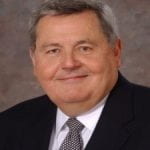
The James A. Purdy Summer Research Fellowship program offers undergraduate students the opportunity to perform medical physics research at a highly ranked academic medical center. The program is aimed at rising junior and senior undergraduate students, particularly those that will become eligible for graduate study in medical physics. To qualify for a fellowship, students must have declared a major or be eligible to declare a major in physics, engineering, or other science.
Fellows will be assigned a research project that matches their interests and will perform this research under the supervision of a medical physicist. Fellows will also have the opportunity to shadow our clinical medical physicists and participate in additional educational experiences.

There will be multiple fellowships awarded, each carrying a stipend provided by the Department of Radiation Oncology at WashU Medicine ($6,000 for Summer 2024). The fellowship will cover a period of 10 weeks during the summer academic semester (May through August). The actual calendar start and end dates are flexible and may be arranged between the fellow and program director.
When and where to apply
To apply, click on the button below, where students will submit the following:
- an application form
- a resume/CV
- unofficial transcript(s)
- contact information for one reference from their home institution
- a brief essay describing their interest in medical physics and what they hope to gain if they are awarded the fellowship
The application deadline is January 15 for the following June start date. (Applications must be officially submitted no later than 10:59 pm CST in order to be considered.) Fellows will be notified of their acceptance by early March.
James A. Purdy, PhD
 As testament to his successful 40 year career, colleagues have hailed James Purdy as one of the most influential practitioners and teachers of medical physics. His research efforts in computer-aided treatment planning, delivery, and quality assurance (QA) continue to have a profound effect on the practice of radiation therapy.
As testament to his successful 40 year career, colleagues have hailed James Purdy as one of the most influential practitioners and teachers of medical physics. His research efforts in computer-aided treatment planning, delivery, and quality assurance (QA) continue to have a profound effect on the practice of radiation therapy.
Dr. Purdy was an early advocate of 3-D conformal radiation therapy (CRT) and continued to pursue the development and refinement of technologies that advanced CRT. In particular, he is noted for his work with the ICRU in formulating the concept of Planning Target Volume. Later in his career, he pioneered the development of an image-based informatics infrastructure along with QA guidelines needed to conduct multi-institutional CRT clinical trials as the modality emerged from a single institution procedure to a research tool in clinical group trials. He was the original Principal Investigator for the NCI sponsored Advanced Technology QA Consortium grant, which facilitated the conduct of advanced technology clinical trials.
The training of medical physicists and residents has also been of special interest to Dr. Purdy. He has mentored numerous physician and physics residents, junior faculty, and lectured in numerous scientific symposia the world over. He established the Radiation Oncology Physics Residency Program at Washington University, which became the first CAMPEP-accredited program in 1997.
Dr. Purdy has been a very successful principal investigator on numerous grants and research contracts sponsored by the National Institute of Health. He is a prolific author with over 200 peer reviewed manuscripts, 150 chapters, and co-editor of 8 published reports and 12 textbooks. He has served as the Senior Physics Editor for The International Journal of Radiation Oncology, Biology, and Physics.
He has received numerous awards, including the American College of Medical Physics (ACMP) Marvin M.D. William Professional Achievement Award (1996), the American Association of Physicists in Medicine (AAPM) William D. Coolidge Award (1997), the American Society for Therapeutic Radiology and Oncology (ASTRO) Gold Medal (2000), and the American College of Radiology (ACR) Gold Medal (2002). He is a past president of AAPM and past chairman of ACMP and a fellow of ACR, ACMP, AAPM, and ASTRO.
Dr. Purdy trained at the University of Texas, M.D. Anderson Cancer Center, and joined the Washington University Radiation Oncology faculty in 1973. He was named Radiation Physics Section Chief in 1976 and Radiation Physics Division Director when Radiation Oncology became a department in 2001. He served as Professor and Vice-chairman, Dept. of Radiation Oncology at the University of California, Davis from 2004 until his retirement in 2011. In 2013, he received the University of Texas, M.D. Anderson Cancer Center Distinguished Alumnus Award.